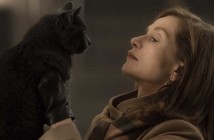Cast: Laetitia Casta, Guillaume Canet, Jean Texier
Director: Christophe Barratier
Country: France
Genre: Adventure | Family
Official Trailer: Here
Editor’s Note: War of the Buttons is now open in limited release
Perhaps most well-known for its highly successful 1994 adaptation by Irish director John Roberts, Louis Pergaud’s anti-war novel War of the Buttons first came to the screen in its native French four decades earlier. Evidently remaining relevant, the book is this year the subject of two new Francophone adaptations, its contextualisation of war by way of a comical story of feuding gangs of rival children offering a timeless framework as pertinent now as it was over six decades ago. Christophe Barratier’s take, differentiated in its native land with the title La Nouvelle Guerre des Boutons, defines itself with its reinvention, shifting the story to take place alongside the French resistance in 1944.
By taking Violette and making her a Jew-in-hiding, Barratier makes all the more significant the text’s chief conceit of simplified warfare; filtering conflict through the eyes of children allowed the novel to expose its grandest follies, and Barratier adapts this wisely to communicate profusely the sheer insanity of the terrible events then taking place throughout Europe.
 Aided immeasurably by the strength of its young cast, Barratier’s film makes fresh the feel of the oft-told story in the considerable energy its stars bring to bear. The leader of the gang the film primarily follows, Lebrac’s impending adolescence finds brooding expression in the work of Jean Texier, the strength of his performance making far less tasking the rather trite approach the story takes to his domestic issues. His blooming relationship with new girl Violette is well-handled, the chemistry Texier shares with Ilona Bachilier adding greatly to their story. Paralleled endearingly, if admittedly unnecessarily, in the tumultuous romance of Lebrac’s teacher and Violette’s guardian, it offers the wealth of the film’s emotional material, the young love superseding all else to capture our affections.
Aided immeasurably by the strength of its young cast, Barratier’s film makes fresh the feel of the oft-told story in the considerable energy its stars bring to bear. The leader of the gang the film primarily follows, Lebrac’s impending adolescence finds brooding expression in the work of Jean Texier, the strength of his performance making far less tasking the rather trite approach the story takes to his domestic issues. His blooming relationship with new girl Violette is well-handled, the chemistry Texier shares with Ilona Bachilier adding greatly to their story. Paralleled endearingly, if admittedly unnecessarily, in the tumultuous romance of Lebrac’s teacher and Violette’s guardian, it offers the wealth of the film’s emotional material, the young love superseding all else to capture our affections.
This War of the Buttons’ great innovation, and certainly the aspect that validates its existence, is the transplantation of its story to Vichy France at the height of the Second World War, a temporal relocation that allows certain subplots to assume renewed significance in this new context. By taking Violette and making her a Jew-in-hiding, Barratier makes all the more significant the text’s chief conceit of simplified warfare; filtering conflict through the eyes of children allowed the novel to expose its grandest follies, and Barratier adapts this wisely to communicate profusely the sheer insanity of the terrible events then taking place throughout Europe. His vision of occupied France is a simplified one, certainly, his portrayal of local sympathies stretching the limits of likelihood to breaking point with the convenience of their nicety, yet nonetheless it’s sweet to see a tale quite so frothy flecked with some degree of historical relevance, its general gaiety imbued with some sense of wider social context.
The striking brightness and beauty of the landscapes, attractively captured, are indication enough of the film’s cheery, unrealistically optimistic register. That it manages within the shell of a chirpily adventurous narrative to say something of the Holocaust’s horrors is achievement enough
 As important as the themes it tackles are, the film often feels a lot more fey than really it is, chiefly the fault of the overly bombastic score, its soaring melodies contributing a heightened sense of cuteness at odds with the seriousness which underlies. Not, that is to say, that it’s a film overtly dramatic in approach: the script offers no shortage of laughs, rich in both characters and situations ripe with a comic potential that Barratier exploits to wonderful ends. The young “petit Gibus” is certainly the most charming of the characters; determined to prove himself as much a man as the rest of the gang, he hurdles toward these battles with a vim as alarming as it is amusing. An early reconnaissance mission in the rival town inadvertently ends with him drinking heartily with a nemesis’ already-inebriated father in a bizarrely tangential yet effectively humourous scene emblematic of his character’s contributions to Barattier’s comic canvas.
As important as the themes it tackles are, the film often feels a lot more fey than really it is, chiefly the fault of the overly bombastic score, its soaring melodies contributing a heightened sense of cuteness at odds with the seriousness which underlies. Not, that is to say, that it’s a film overtly dramatic in approach: the script offers no shortage of laughs, rich in both characters and situations ripe with a comic potential that Barratier exploits to wonderful ends. The young “petit Gibus” is certainly the most charming of the characters; determined to prove himself as much a man as the rest of the gang, he hurdles toward these battles with a vim as alarming as it is amusing. An early reconnaissance mission in the rival town inadvertently ends with him drinking heartily with a nemesis’ already-inebriated father in a bizarrely tangential yet effectively humourous scene emblematic of his character’s contributions to Barattier’s comic canvas.
Were this a real war film, we can be certain that Gibus would not make it out alive. His is the sort of character whose innocence must be sacrificed to make appreciable the true ugliness of human conflict, and in a sense War of the Buttons never quite manages to communicate such terrors. But perhaps that’s an unfair expectation with which to burden the film: in essence a family-oriented film with a refined maturity of theme, to saddle it with the requisite darkness to make palpable the terror of the time would make it all but inaccessible to its intended audience. The striking brightness and beauty of the landscapes, attractively captured, are indication enough of the film’s cheery, unrealistically optimistic register. That it manages within the shell of a chirpily adventurous narrative to say something of the Holocaust’s horrors is achievement enough, easily outweighing the efforts of last week’s contemporaneous The Round Up. This is no great work of storytelling, nor even the finest adaptation of its source, but it meets its aims with handsome effect, admirably entwining education and entertainment.
[notification type=”star”]68/100 ~ OKAY. War of the Buttons is no great work of storytelling, nor even the finest adaptation of its source, but it meets its aims with handsome effect, admirably entwining education and entertainment.[/notification]



